|
Featured picture tools: |
These featured pictures, as scheduled below, appeared as the picture of the day (POTD) on the English Wikipedia's Main Page in January 2011. Individual sections for each day on this page can be linked to with the day number as the anchor name (e.g. [[Wikipedia:Picture of the day/January 2011#1]] for January 1).
You can add an automatically updating POTD template to your user page using {{Pic of the day}} (version with blurb) or {{POTD}} (version without blurb). For instructions on how to make custom POTD layouts, see Wikipedia:Picture of the day.Purge server cache
January 1

|
|
A panoramic view of Parliament House, the meeting facility of the Parliament of Australia located in Canberra, the capital of Australia. At the time of the completion in 1988, it was the most expensive building in the Southern Hemisphere at over AU$1.1 billion. The building contains 4,700 rooms and many areas are open to the public. From above, it appears as two boomerangs enclosed within a circle. Much of the building is underground, located beneath Capital Hill. Photo: John O'Neill
Recently featured:
|
January 2

|
A flower and leaves of a Pink Knotweed (Persicaria capitata), an ornamental plant native to Asia. It is a prostrate herb with leaves that are 1–6 cm (0.4–2.4 in) long and 7–30 mm (0.3–1.2 in) wide, and spikes that are 5–10 mm (0.2–0.4 in) long and 5–7 mm (0.2–0.3 in) in diameter. Photo: Noodle snacks
Recently featured:
|
January 3

|
A scene from Oscar Wilde's 1895 play An Ideal Husband, originally published in a 1901 collected edition of Wilde's works. The comedy, which opened January 3, 1896, at the Haymarket Theatre in London, revolves around blackmail and political corruption, and touches on the themes of public and private honour. It has been adapted into television, radio/audio, and three films. The published version differs slightly from the performed play, for Wilde added many passages and cut others. Prominent additions included written stage directions and character descriptions. Wilde was a leader in the effort to make plays accessible to the reading public. Artist: Unknown; Restoration: Adam Cuerden
Recently featured:
|
January 4

|
The climactic scene from Act III of The Wicked World (1873), a blank verse play by W. S. Gilbert about how female fairies cope with a sudden introduction to them of men and "mortal love". This is one of several "fairy comedies" by Gilbert, and it established him as a writer of wide range, propelling him beyond the burlesques he had produced in his early career, and leading towards his famous Savoy operas. Illustration: D. H. Friston; Restoration: Adam Cuerden
Recently featured:
|
January 5

|
An 1880s poster for Strange Case of Dr Jekyll and Mr Hyde, a novella by Robert Louis Stevenson known for its vivid portrayal of a split personality, wherein within the same person there is both an apparently good and an evil personality, quite distinct from each other. It was a huge success, with over 40,000 copies sold in the first six months after publication. Poster: National Prtg. & Engr. Co.; Restoration: PLW
Recently featured:
|
January 6

|
Evania appendigaster is a species of ensign wasp, a family of parasitoid wasps whose larvae are known to be predatory on cockroaches. However, hosts for 96% of the over 400 species are not yet known, so it is likely that more unusual life histories exist. Ensign wasps are found worldwide, apart from the polar regions. Photo: Muhammad Mahdi Karim
Recently featured:
|
January 7

|
A male Magpie-lark (Grallina cyanoleuca), a common Australian bird of small to medium size. Like many Australian birds, it was named for its physical similarity to the northern hemisphere birds familiar to European settlers. In fact, it is neither a magpie nor a lark and is not particularly closely related to either. Photo: Fir0002
Recently featured:
|
January 8
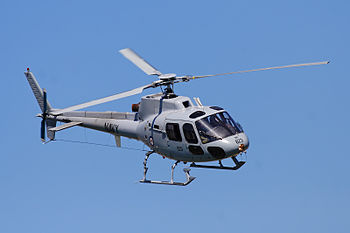
|
A Eurocopter AS350 "Squirrel" helicopter flown by 723 Squadron of the Fleet Air Arm (FAA), the section of the Royal Australian Navy responsible for the operation of aircraft. The FAA is currently an all-helicopter force, operating four separate models in the anti-submarine warfare and maritime support roles. Photo: Fir0002
Recently featured:
|
January 9

|
|
U.S. President Calvin Coolidge shaking hands with baseball player Walter Johnson and presenting him with a "diploma" for the Washington Senators winning the 1924 American League championship. Johnson was one of the most accomplished pitchers in Major League Baseball history. He established several pitching records, some of which remain unbroken, including career shutouts (110) and most consecutive seasons leading the league in strikeouts (8). Photo: National Photo Company; Restoration: Staxringold
Recently featured:
|
January 10

|
A polished sample of opal, a mineraloid gemstone, that occurs in the fissures of almost any kind of rock, being most commonly found with limonite, sandstone, rhyolite, marl, and basalt. Opal comes in a wide variety of colors, with red against black being the most rare, whereas white and green are the most common. Photo: Noodle snacks
Recently featured:
|
January 11

|
Gunnar Sønsteby (born January 11, 1918), known by the code names of Kjakan (The Chin) and No. 24, was a member of the Norwegian resistance during World War II. He is the most decorated person in Norway, and the only one to have been awarded the War Cross with three swords. He was the head of the Norwegian Independent Company 1 group, which committed numerous acts of sabotage against the Nazi regime. This put him high on the Gestapo's most wanted list, but he was never captured. Now in his 90s, he still gives frequent talks about his wartime experiences. Photo credit: Arne Flaaten
Recently featured:
|
January 12

|
Flowers of Luculia gratissima, a species of shrub in the small genus Luculia, all of which are native to eastern South Asia and southern East Asia. The plants have large leaves from 20 to 35 cm (8 to 14 in) with prominent veins carried in opposite pairs and with a terminal of an umbel or corymb of tubular/open ended white, pink or creamy flowers with five spreading petals. Photo: JJ Harrison
Recently featured:
|
January 13
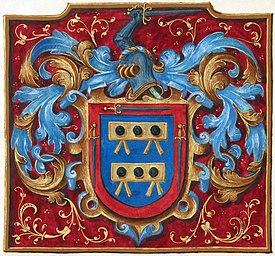
|
A Grant of Arms by Philip II of Spain to Alonso de Mesa and Hernando de Mesa, signed 25 November 1566. In Spanish heraldry, coats of arms were granted based almost entirely on military service, which made it possible for commoners to join the ranks of the Spanish nobility. Also unique to Spain was that titles could be inherited through females and via illegitimacy. Image: Royal Household of Spain; Restoration: Lise Broer
Recently featured:
|
January 14

|
A person engaged in tubing (or "inner tubing"), the recreational activity of riding an inner tube, either on water, snow, or through the air. Tubing on water generally consists of two forms: free-floating and towed (shown here). In the latter, one or more riders tether their tubes to a powered watercraft, which tows them along the surface of the water. Photo: Peter Opatrny
Recently featured:
|
January 15

|
Jimmy Wales is the co-founder of the online encyclopedia Wikipedia, along with Larry Sanger and others. Wikipedia succeeded an earlier attempt at an encyclopedia called Nupedia, but Nupedia grew slowly because of its onerous submission format, which required articles to be peer reviewed. Sanger was then introduced to the concept of a wiki, and thus Wikipedia was born. Wales continues to serve on the Board of Trustees of the non-profit Wikimedia Foundation, and he also co-founded Wikia, a for-profit wiki hosting site. Photo: Manuel Archain
Recently featured:
|
January 16

|
The Globe Skimmer (Pantala flavescens) is the most widespread dragonfly species on the planet, found between about the 40th parallels of latitude, or where the annual mean temperature is above 20 °C (68 °F), except in Europe where there are only occasional sightings. Photo: Muhammad Mahdi Karim
Recently featured:
|
January 17
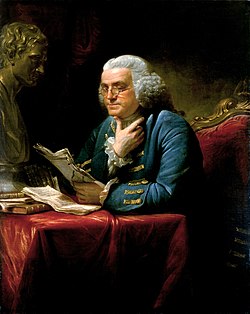
|
A painting of Benjamin Franklin (1706–1790), one of the Founding Fathers of the United States, in London, 1767, wearing a blue suit with elaborate gold braid and buttons, a far cry from the simple dress he affected when he served as ambassador to France in later years. During his time in London, Franklin was the leading voice of American interests in England. He wrote popular essays on behalf of the colonies and was instrumental in securing the repeal of the 1765 Stamp Act. The painting was done by David Martin and is currently on display in the White House. The bust on the left side is of Isaac Newton.
Recently featured:
|
January 18

|
The Rufous Whistler (Pachycephala rufiventris, male shown here) is a species of whistler found in New Caledonia, Papua New Guinea, and throughout Australia (with the exception of Tasmania). Predominantly a reddish-brown and grey bird, it has a variety of musical calls. Photo: Fir0002
Recently featured:
|
January 19
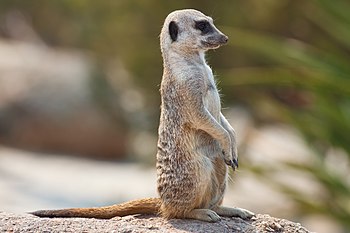
|
The meerkat (Suricata suricatta) is a small member of the mongoose family native to the Kalahari Desert of southern Africa. They are social animals, living underground in groups of 20 to 50 members. Although the name means "lake cat" in Dutch, meerkats are not cats, nor are they attracted to lakes. Photo: Fir0002
Recently featured:
|
January 20
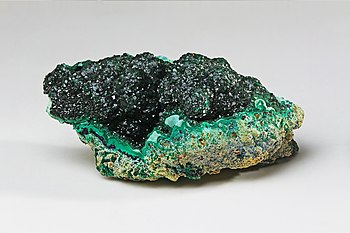
|
A sample of malachite, a green copper carbonate mineral that crystallizes in the monoclinic crystal system. It is typically associated with copper deposits around limestone, and is often found together with azurite. Malachite was used as a mineral pigment in green paints from antiquity until about 1800, and is still used today for decorative purposes and to make jewelry. Photo: JJ Harrison
Recently featured:
|
January 21

|
Danny Lee Wynter is an English actor of Italian and Jamaican descent. He has starred in several theatre productions, including King Lear, Henry IV, Part 1 and Henry IV, Part 2, all at Shakespeare's Globe. He has also had guest appearances in various television programmes such as Luther, Trial & Retribution, and Holby City. Lee Wynter lives and works in London. Photo: Johan Persson
Recently featured:
|
January 22
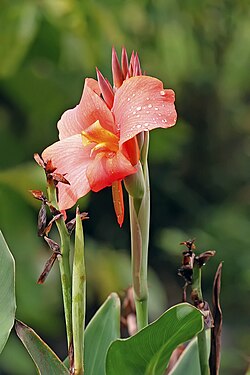
|
Flowers of a canna lily hybrid. Canna lilies are members of the genus Canna. They are not true lilies, and are more closely related to the other plant families in the order Zingiberales, such as the gingers, bananas, marantas, heliconias, and strelitzias. There are nineteen known species and numerous cultivars, all of which have large, attractive foliage, making it a popular garden plant. In addition, it is one of the world's richest starch sources, and as such is used in agriculture. Photo: Muhammad Mahdi Karim
Recently featured:
|
January 23

|
Zack Greinke is a pitcher for the Major League Baseball team Milwaukee Brewers. He began his career with the Kansas City Royals (as pictured here), during which time he won the American League Cy Young Award, given to the league's best pitcher. In December 2010, Greinke asked to be traded, saying he was not motivated to play for a rebuilding team. Photo: Keith Allison
Recently featured:
|
January 24
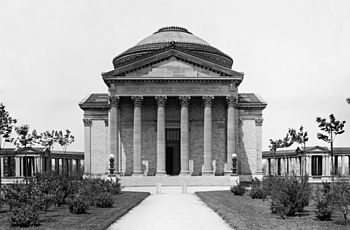
|
The library of Bronx Community College in 1904, when the campus was part of New York University, located in the University Heights neighborhood of The Bronx. It was designed in the Neo-Renaissance style by Stanford White. Behind the library can be seen the Hall of Fame for Great Americans, the first hall of fame in the United States. Photo: Detroit Photographic Co.; Restoration: Lise Broer
Recently featured:
|
January 25

|
A mid-1800s photo of a train station with train and coal depot, taken by Gustave Le Gray, "the most important French photographer of the nineteenth century" because of his technical innovations in the still-new medium of photography and his role as the teacher of other noted photographers. Two of his photographs were sold in 1999, setting world records for most expensive single photograph ever sold at auction. Restoration: Lise Broer
Recently featured:
|
January 26

|
The geography of Australia, the world's smallest continent, encompasses a wide variety of biogeographic regions. By surface area, it is the sixth-largest country in the world, but as can be seen in this composite satellite image, much of the interior is arid desert. The vast majority of the human population is concentrated along the eastern and southeastern coasts, and it is the fiftieth most populous nation.
Recently featured:
|
January 27

|
A flesh-fly "blowing a bubble". The diet of the flesh-fly is very high in water content. The fly regurgitates the liquid portion of the food, holds it whilst evaporation reduces the water content, and then swallows a much more concentrated food meal without the water content. This continues until an appropriate amount of liquid is left for the fly. Photo: Fir0002 |
January 28
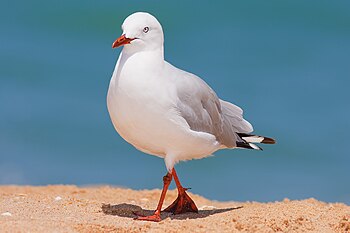
|
The Silver Gull (Chroicocephalus novaehollandiae) is the most common gull seen in Australia. It is found throughout the continent, having adapted well to urban environments and thriving around shopping centres and garbage dumps. The Silver Gull should not be confused with the Herring Gull (Larus argentatus), which is called "silver gull" in many other languages. Photo: Fir0002 |
January 29

|
The Mantra-Rock Dance musical event took place on January 29, 1967, at the Avalon Ballroom in San Francisco and came to be dubbed as the "ultimate high" and the "major spiritual event" of the hippie era. It was organized by the early followers of the Hare Krishna movement as a promotional and fundraising effort for their first temple on the West Coast. One of them, Harvey W. Cohen, created the Stanley Mouse inspired promotional poster (pictured). The Mantra-Rock Dance featured the Hare Krishna founder Bhaktivedanta Swami, the countercultural ideologues Allen Ginsberg and Timothy Leary, and leading rock groups the Grateful Dead, Moby Grape, and Janis Joplin with Big Brother and the Holding Company. The event caused the Hare Krishna mantra to be adopted by all levels of the counterculture as a "loose commonality" and a viable alternative to drugs. Artist: Harvey W. Cohen
Recently featured:
|
January 30

|
A sample of pure synthetic crystals of gold , made by the chemical transport reaction in chlorine gas. Gold is a precious metal used in jewelry, coins, and industrial uses such as dentistry and electronics. It is malleable and ductile, and does not oxidize in air or water. Photo: Alchemist-hp |
January 31

|
Sunflowers (Helianthus annuus) are large flowering plants native to the Americas. They most commonly grow to heights between 1.5 and 3.5 m (5 and 11 ft), although the tallest known sunflower reached 12 m (39 ft) high. The large inflorescence is composed of a flower head (or "composite flower") of numerous florets (small flowers) crowded together. The florets within the sunflower's cluster are arranged in a spiral pattern and will mature into seeds. The seeds are used as snack food, expeller pressed into sunflower oil, made into sunflower butter (a peanut butter alternative), or milled into flour. Photo: Fir0002 |
Picture of the day archives and future dates